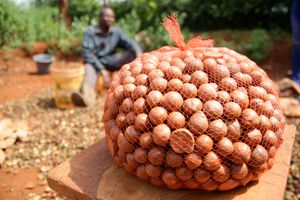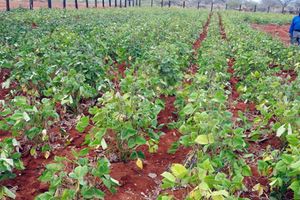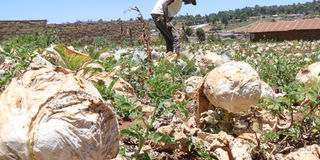
A farmer in Molo on February 28, 2025 inspects his cabbage crop that is rotting in the farm due to lack of market.
Peter Kimani, a cabbage farmer in Molo, Nakuru County, is a bitter man.
Like many cabbage farmers, he is counting losses as prices plummet to as low as Sh1 per head, down from an average of Sh100 just a few months ago.
With no buyers willing to offer better prices, acres of cabbage fields in Molo are now turning into wastelands as the produce rots on the farms.
Kimani blames unscrupulous middlemen, who he says exploit them by dictating the prices.
The brokers buy cabbages at throwaway prices, only to sell them at much higher rates in urban markets.
“We have no choice but to accept their offers, or the cabbages will go to waste. The crisis has left many struggling to recover their investments with some, like me, now contemplating abandoning cabbage farming altogether. We are being exploited. The brokers buy from us at throwaway prices and sell at huge profits in urban markets. It’s heart-breaking to see all our hard work go to waste,” Kimani lamented.
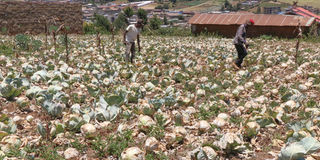
Farmers in Molo on February 28, 2025 inspect cabbage crop that is rotting in the farm due to lack of market.
Like many other farmers, Kimani says the government should step in and regulate market prices to ensure that farmers get a fair deal for their produce.
Kimani’s experience, according to agricultural economists, is a reflection of how Kenya’s food supply system is broken, with farmers struggling with low prices while consumers complain about the high cost of food.
Yet, in between these two realities lies an invisible but powerful force—brokers.
These middlemen control the food market, dictate prices, manipulate supply and create artificial shortages to maximise their profits.
While a well-functioning agricultural marketing system should ensure fair prices for both farmers and consumers, in Kenya the lack of a streamlined market structure has created a breeding ground for exploitation.
Brokers dominate the supply chain, dictating the price farmers receive and what consumers pay.
The government has repeatedly promised to address this issue through initiatives such as industrial parks and cold storage facilities, but these promises remain largely unfulfilled, allowing brokers to continue their stranglehold on the food system.
While Kenyans complain about rising food prices, farmers in major agricultural counties such as Narok, Nyandarua and Laikipia are grappling with poor farm gate prices.
In Narok, maize farmers had a bumper harvest this season, but brokers are yet to buy their produce in large volumes. Instead, they have shifted their focus to other regions such as Western Kenya and parts of the Rift Valley, strategically waiting until Narok farmers become desperate enough to sell at throwaway prices.
“It is a deliberate scheme. Millers and brokers work together to manipulate the market. They avoid buying maize from one region until farmers are on the verge of losses, then swoop in and dictate prices. Meanwhile, in urban areas, the same maize is sold at double or even triple the farm-gate price,” agricultural economist Reuben Wachira told Nation.Africa.
In the case of grains, Wachira explains that most millers are also brokers of the farm produce or have identified brokers to work for them.
“What happens is that if the millers or the brokers don’t import, they will collude to buy certain food produce from a specific area at an agreed price per bag. They will completely abandon a given area until the farmers are so desperate and willing to sell at any price,” explains Wachira.
“Take the example of Narok where most farmers had a bumper maize harvest, but brokers have not yet shown up, they are buying in other parts of the Rift Valley and Western Kenya, waiting for Narok farmers to get desperate.”

Catherine Muthama, a trader at Top Market in Nakuru City, on December 17, 2024 inspects her red and yellow capsicum sourced from Laikipia.
A similar situation is unfolding in Nyandarua and Laikipia counties where cabbage and potato farmers are struggling to find buyers.
Jacob Mwaura, a truck driver who transports fresh produce, has witnessed farmers dumping their harvest in frustration.
“The brokers have taken over everything. Even when farmers bring their produce to the market, they are forced to sell through brokers or risk making huge losses. If they try to bypass them and sell directly to traders, the brokers retaliate by blocking access to major buyers,” he says.
Mwaura recalls an incident where a farmer hired him to transport cabbages from Nyandarua to Mombasa.
“We stayed in Mombasa for three days because the brokers refused to buy at the farmer’s asking price. In the end, he sold at throwaway prices. The farmer made losses while the brokers ensured they still got their 100 percent profit margin,” he explains.
While farmers are receiving poor prices, consumers are struggling with skyrocketing costs as the retail price of maize, wheat and vegetables is often double or even triple what farmers receive.
In Nyahururu and Ol Kalou towns, for example, imported wheat sells for between Sh4,000 and Sh4,500 per bag, while locally produced wheat costs between Sh5,000 and Sh5,600.
In the same towns, between 2003 and early last year, a bag of imported maize sold for an average of Sh6,000, while locally produced maize sold for an average of Sh8,000.
Similarly, farmers in Narok sell a bag of maize for between Sh2,500 and Sh3,000, but the same maize is sold for between Sh4,500 and Sh5,000 in Nyandarua.
The huge price difference raises the critical question of who is pocketing the extra money.
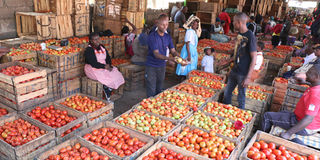
Tomato traders at Wakulima market on February 18, 2025.
According to Wachira, brokers manipulate the market to ensure that they remain the biggest beneficiaries.
“Brokers are always looking for a 100 percent profit margin or more. It makes no sense for consumers to complain about expensive food while farmers are crying over poor prices. This means that there is an intentional and well-orchestrated manipulation of the market,” the economist explained.
Wachira says brokers use several tactics to maintain their grip on the food supply chain, including creating artificial shortages, fixing prices, dominating markets and influencing traders.
He adds that the government, through county officials, has the power to regulate markets and support direct farmer-to-consumer sales, but corruption often stands in the way.
“Some county officials take bribes from brokers to allow them to control markets. Farmers rarely get support from the government, and in the end, both the producer and the consumer suffer,” he says.
Kenyan cereals, for example, are often considered superior in quality to imports from neighbouring countries. However, due to high production costs local produce is priced higher.
“A bag of imported maize sells for much less than locally produced maize. But the quality is different as Kenyan maize is heavier, whiter and cleaner. But traders prefer to stock cheaper imports because they make more profit,” says Emma Njuguna, a trader in Nyahururu.
“Similarly, brokers manipulate vegetable supply by preferring imports over local produce. Onions and cabbages from Tanzania, for instance, are preferred in many Kenyan markets because Tanzanian authorities strictly regulate chemical use and harvesting practices.
“Tanzanian vegetables have a unique taste because they use fewer chemicals. Kenyan farmers on the other hand are increasingly using herbicides to force crops like wheat to dry faster, a dangerous trend that affects quality,” explained Ms Njuguna.
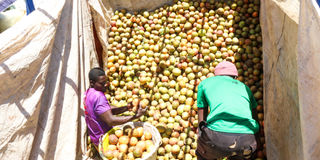
Traders at Wakulima Market in Nakuru City sort mangoes sourced from Ukambani on February 23, 2025.
She admits that brokers have an unchecked influence in the food supply chain, noting that currently, there are farmers in Nyandarua and Laikipia counties lamenting about the lack of cabbage markets, yet the same is expensive in the markets.
“The government needs to ask and get a solution as to why food prices are high for consumers but not for producers. Currently, we are buying cabbage at Sh50, yet the brokers buy it between Sh5 and Sh15 from the farmers. Why do we have farmers complaining of poor Irish potato prices at as low as Sh500 per overweight bag in Nyandarua, yet the same is affordable in Nairobi? We can address these challenges by constructing industrial parks, building cold storage facilities, and supporting farmers’ sales through cooperatives and aggregation,” says the trader.
Nyandarua Agriculture Executive Francis Miring'u admits that farmer exploitation remains a thorny issue.
He also attributes farmer exploitation to the laxity of relevant government agencies in enforcing farmer-friendly regulations, citing the example of the potato regulation.
“A lasting solution is formation of strong farmer cooperative societies. In Nyandarua, we have introduced aggregation model of marking farm produce. We are strengthening our cooperative societies, an effort that has culminated in the revival on giant Nyandarua Cooperative Union as a long-term intervention," said Mr Miring'u.
He adds that all county governments, supported by the national government, should aggressively enforce farmer-friendly regulations.
“This is not a one county challenge. You will find that buyers will move to other counties to buy Irish potato if Nyandarua enforces the potato regulations. That hurts our farmers, but it's a battle that can be won if every county and national government agency plays its part,” says the CEC.
